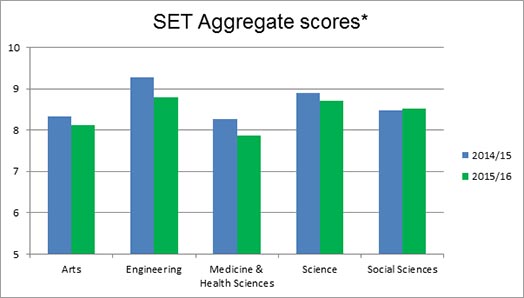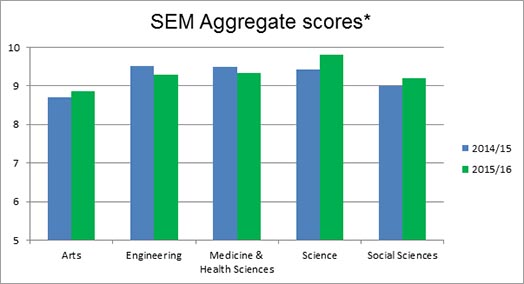
Students give teachers top marks
February 25th, 2016
Students rate the quality of teaching and modules at The University of Nottingham very highly according to the latest feedback.
In the Autumn Student Evaluation of Teaching (SET) and Student Evaluation of Modules (SEM), teaching staff across all faculties scored highly in the assessment of their ability to communicate clearly, retain the interest of a class, their approachability and contribution to student learning.
Feedback on modules was equally positive with all five faculties scoring highly in the assessment of module objectives, teaching and assessment methods, appropriate academic level and workload.
The Evaluate SET/SEM programme asks students to respond to a series of positive statements about the ability of individual teachers and the quality of modules, selecting one of five options from ‘Strongly agree’ (1) to ‘Strongly disagree’ (5).
Student Evaluation of Teaching
Teaching staff in every faculty achieved mean scores between 1(Strongly agree) and 2 (Agree) in every question area, with four of five faculties also recording an aggregate improvement on 2014/15 figures.

*Scores are an aggregate of all five questions with 5 being the highest and 25 being the lowest score possible. The average aggregate SET score for the University for semester one 2015/16 was 8.3.
The SET asks students to rate how strongly they agree with the following statements:
- The teacher was an able communicator
- The teacher retained my interest
- The teacher was approachable
- Sessions were based appropriately
- Overall, this teacher assisted my learning
Student Evaluation of Modules
Students’ assessment of modules produced similar levels of consistency across the University with aggregate scores again rating between ‘Strongly agree’ and ‘Agree’ across all question areas, although three of five faculties witnessed a drop in performance compared to 2014/15.
All Schools make individual SEM scores available to students via the School Moodle module pages.

* Scores are an aggregate of all five questions with 5 being the highest and 25 being the lowest score possible. The average aggregate SEM score for the University for semester one 2015/16 was 9.26.
Evaluating Evaluate
The University introduced Evaluate in September 2014, replacing previous paper based surveys with a new wireless ‘in class’ tool to capture SET and SEM data. Following a successful launch last year, accurate year-on-year data is now available for the first time.
Professor Sarah O’Hara, Pro-Vice-Chancellor for Education and Student Experience, believes that the level of analysis available as a result will make a huge difference to teaching and learning at the University.
“Moving away from the paper based system is not only more sustainable but it means that we’re able to examine feedback much more closely. With the new system analytics are instantaneous, meaning that we can identify strengths and weaknesses much more quickly” she said.
“In the past we know that students have grown frustrated as they would like to see aspects of teaching to change. Evaluate also makes it much easier for us to provide feedback to students on their feedback to us.”
The Evaluate process also provides students with the opportunity to make open text comments on various elements of teaching and modules. Although anonymised, an accurate record is now kept of all open comments where they may have been otherwise lost in the old paper based system.
“I’ve been struck by the constructiveness of the comments that we’ve received via the latest SET/SEM” added Sarah. “It’s fantastic to see our students providing such respectful, measured and responsible feedback that will make a real difference to the University moving forward.”
More information on Evaluate can be found on the Professional Development web pages.
Peer Observation College – sharing good teaching practice
The University has also recently announced the launch of The Peer Observation College (POC), offering teaching staff the opportunity to be observed by an experienced academic from another school. The POC aims to support colleagues who wish to improve their teaching through observation of their teaching and learning practice.
Tags: Evaluate, feedback, Sarah O'Hara, SEM, SET, Student Evaluation of Modules, Student Evaluation of Teaching, teaching and learning
Leave a Reply
Other News

Major road resurfacing works: Monday 22 – Friday 26 April
A number of diversion routes will be in place from Monday 22 – Friday 26 April […]

Call for staff helpers – Undergraduate open days
The university is looking for staff volunteers to help at university open days on Friday 28 […]

